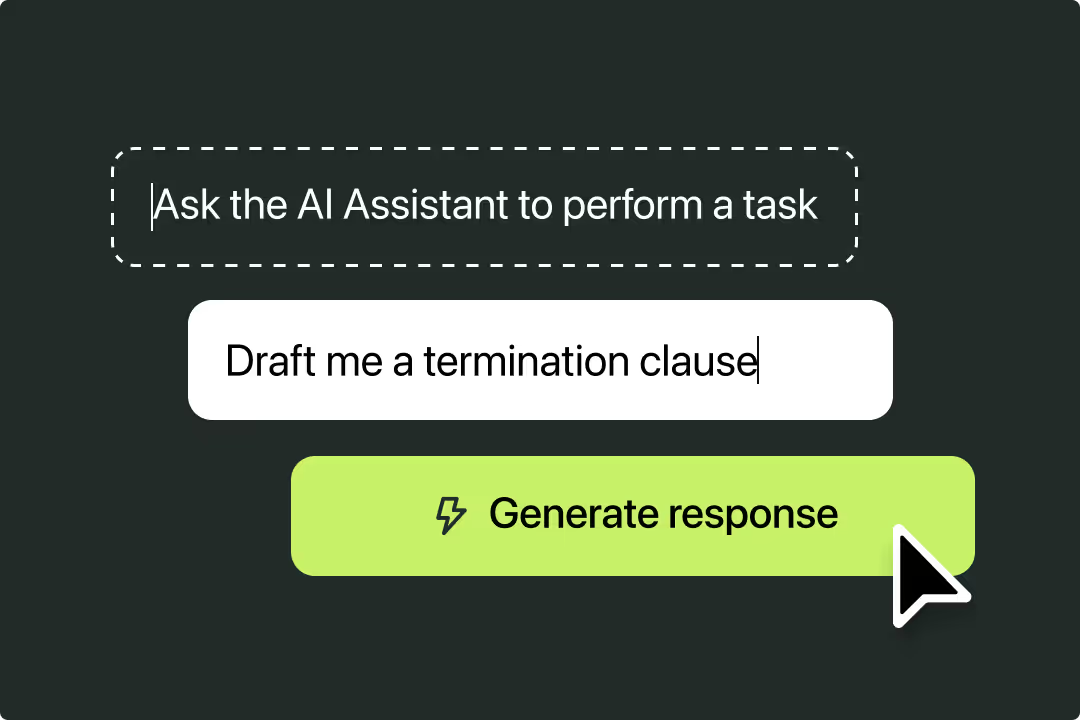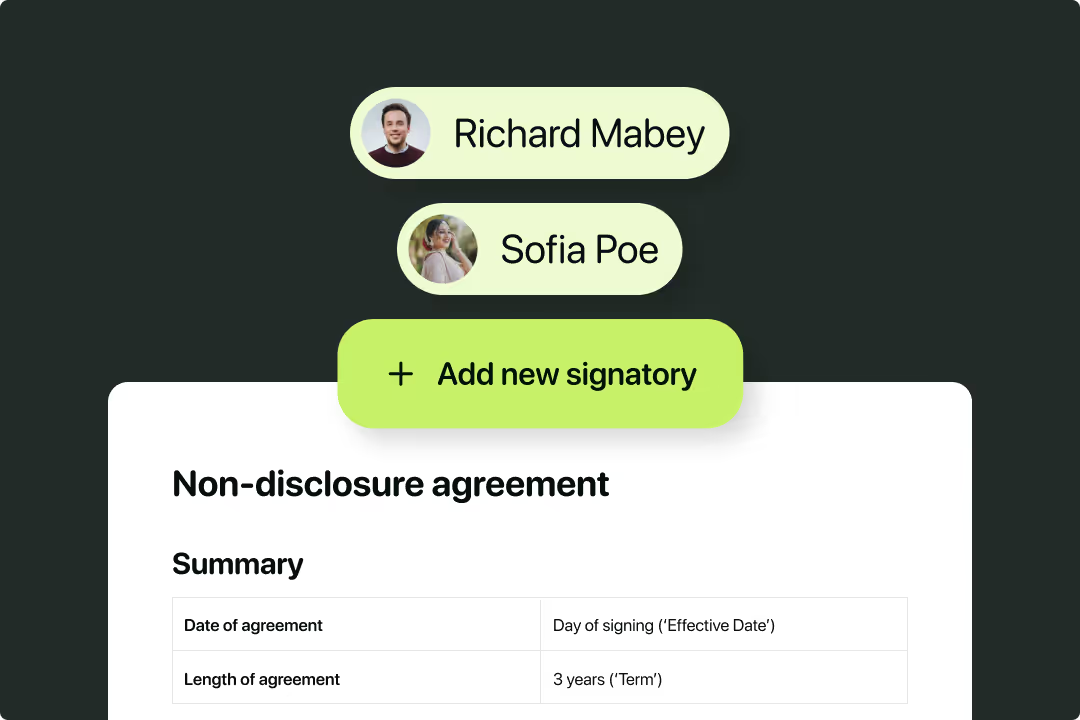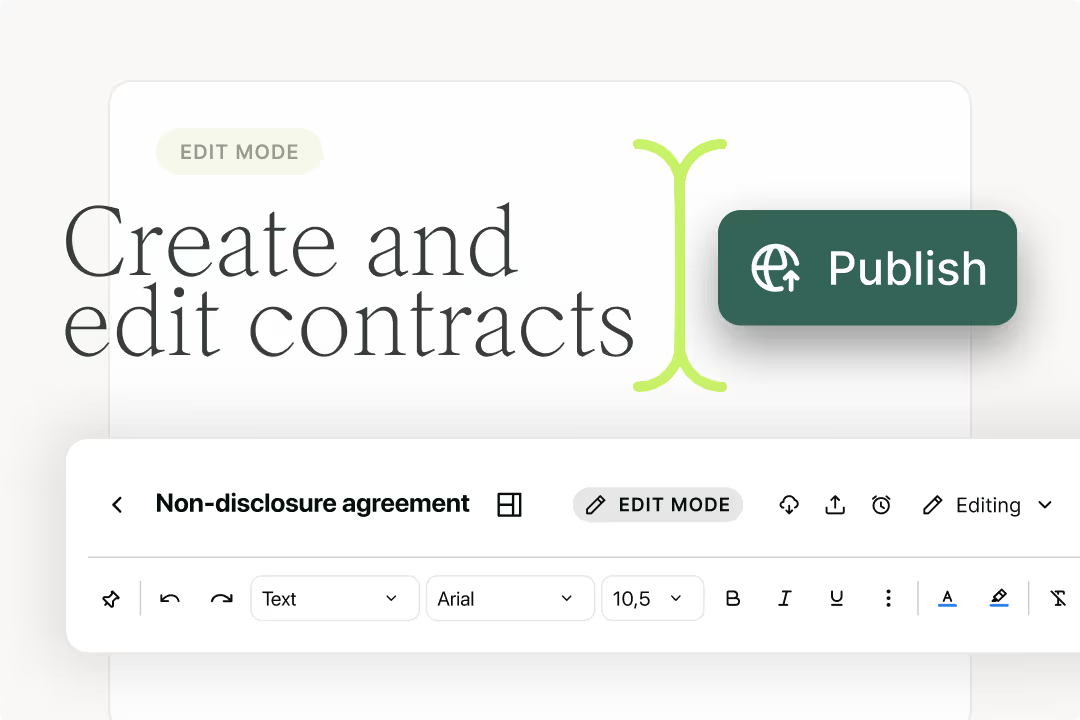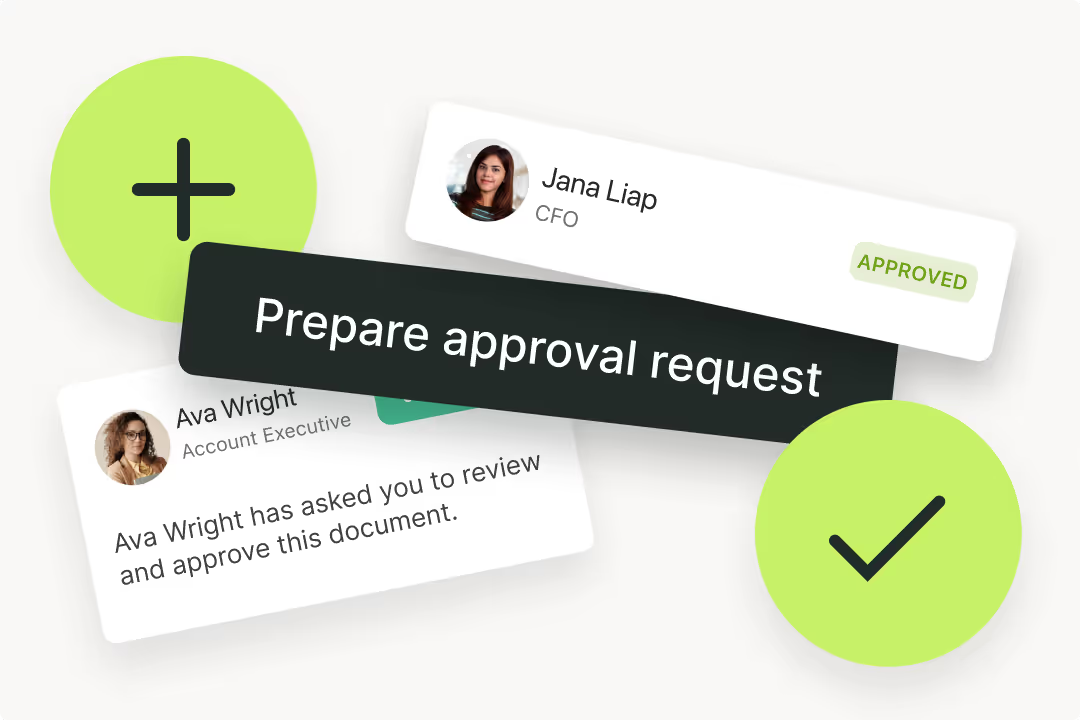Solutions
Customer Support
Resources
Contract playbooks have gone from a "nice-to-have" to a cornerstone of modern legal operations. In 2026, they’re everywhere—especially in scaling businesses where in-house legal teams face mounting pressure to do more with less.
With routine contract work piling up, lawyers are increasingly turning to playbooks to delegate low-value admin and focus on the high-impact legal work that really moves the needle.
Why the shift? Well, legal teams have found themselves drowning in a sea of repetitive, low-complexity contracts for a while now.

But the advent of tech-enabled contract playbooks present an exciting future.
It's a future where contract creation and review can be delegated to commercial colleagues, or even software, with results that remain predictable, and more importantly, consistent with guidelines set and approved by legal.
Contract playbooks enable this future, and in this guide, we'll how you how the experts are using them to get ahead.
A contract playbook is a compilation of different information targeted at streamlining, standardizing and codifying the process for managing contracts.
This document or asset contains a wealth of information and knowledge about the collaboration, negotiation, review and approval stages of contracts. It outlines the context stakeholders need to make quick but informed decisions on contracts, whether that's when to approve a term, or how to push back on certain asks. A comprehensive contract playbook has it all.
This information is commonly used to empower individuals to handle key parts of the contract process themselves, without needing to rely on a lawyer at every stage.

Contract playbooks can exist in various forms. However, most will be stored in spreadsheets or as notes in other platforms like Google Docs, Notion, Clickup, or Airtable. We've even heard about cases where the contracting guidelines are passed back and forth via communication platforms like Slack or Gmail, which sounds a little painful.
However, the more modern approach to contract playbooks usually involves a contract management solution of some sort. When you use a solution like Juro, you'll even be able to use AI to automate these playbooks further, with the option for Juro's legal AI to draft and review contracts in line with your uploaded playbooks and guardrails.
This makes it easier than ever to empower teams to self-serve on contract creation safely. If you'd like to explore this functionality further, hit the button below to speak to our team. But if you're still grappling with the basics of contract playbooks, keep reading. We'll equip you with the tools and knowledge you need to make playbooks a success in 2026.

But why exactly do contract playbooks exist? Well, contract playbooks serve a number of different purposes, including that they:
{{quote1}}
A contract playbook is also often referred to as a contract negotiation playbook, since it typically comprises large quantities of information that guides business and legal teams to self-serve on contract negotiation and review.
For example, a contract playbook will usually cover the following information:

Typically, the legal team will be responsible for creating a contract playbook, and it is usually driven and informed by the key legal practitioners in an organization who are experienced in dealing with different contract types and scenarios.
However, a contract playbook can be used by anybody that is involved in the contract workflow at any stage, whether they are part of legal, the HR function or the sales team.
For instance, in businesses where legal teams have enabled commercial departments to self-serve on routine contracts, these commercial teams will also be expected to refer to the contract playbook for useful information and guidance during negotiations. This is because it prevents the need to involve legal on repetitive tasks, and empowers legal teams to return to high value work whilst business teams self-serve.
Ultimately, anyone that is expected to self-serve on contracts will benefit from having a contract playbook to hand.
Check out these case studies with real-life GCs discussing their approach to the contract process, and how they empower their commercial teams to self-serve:
First, decide how you want to create your playbook, and where you want it to be accessed from. Traditionally, this information would be kept on paper and stored in filing cabinets within an office. Those days are over.
Having a digitized playbook provides a dynamic, easy and fast way to access important information. It also makes far easier to update and amend when things change (more on that later).
The biggest benefit of digitizing your contract playbook by automating it using a contract tool like Juro is that you can centralize information and remove the discretion associated with using it.
Unlike a contract playbook stored in Notion or Google Docs, an automated playbook will lock down clause variations using conditional logic. This prevents business teams from neglecting the playbook rules, as all of the fallbacks and rules are applied consistently and automatically.
Juro's legal AI assistant can even incorporate your contract playbooks into its responses, from new clauses drafted with your guardrails in mind to instant access to a list of ways the agreement deviates from your standard terms. Juro makes your contract playbooks easier to access than ever before.

Before deciding how you’re going to compile your contract playbook, it’s important to create a bank of information that you intend to include. Essentially, this should include any information that you’d previously provide in a different format to those managing contracts, and it provides the foundation for the playbook, which you can then try to fill the gaps in afterwards.
This information can usually be sourced from:
When building your contract playbook, consider who your users will be. In many cases, various business teams will rely on a contract playbook to provide them with guidance. Therefore, it’s important to ensure that you provide information to help them with their specific requests.
Not only that, but the team responsible for drafting the playbook also needs to account for the fact that commercial teams may have much more limited legal knowledge than legal teams, and will therefore need concepts to be explained fully and in a more simplistic way.

If you want your contract playbook to properly empower users to self-serve on contracts, you need to design it in a way that they find accessible and can understand.
There will be nuances to this for every business, as Willem Wellinghoff, CCO at Ecommpay explains:
"Sharing information comes back down to your product itself. It’s important to ensure that all the teams are knowledgeable about the different offerings and the structures that surround them - from risk appetite, to regulatory framework."
When drafting a contract playbook, you should also give as much detail as possible about different instances, rules and workflows. Remember, your audience probably haven't spent years in law school or private practice. A lot of the legal jargon and tendencies will be new to them.
Delivering lots of detail will enable you to minimize risk as much as possible, since it will eliminate any ambiguity and room to make costly mistakes.
One of the most successful approaches is to include examples, templates and detailed explanations to your playbook, since this helps to ensure that the teams self-serving on contracts not only know what to do, but that they also understand why they are doing it for the future.
Since a contract playbook will typically be jam-packed with important information, it can quickly become heavy and overwhelming for readers, causing them to struggle to process the most important points or worse, refrain from using it at all.
That’s why it’s important to design the playbook to portray the most important information clearly first, and that you supplement the document with visual aids, flow-charts and other structural cues that make it more digestible.

Once you have pulled a robust contract playbook together, you need to equip your legal team and those they enable to use it. This often means providing effective training sessions to ensure that the users understand the content in the playbook but also how to apply this knowledge in practice. This training should be updated regularly as the playbook itself adapts and evolves.
Stephanie Dominy, General Counsel at Staffbase offers some great advice here:
"Adopting a new system can get challenging, and a lack of context and understanding could lead to ambiguity. Teach sales how to engage with legal, and where legal expects them to take responsibility," she says.
Once you've built and implemented your company's contract playbook, it's well worth measuring how effective it has been and how consistently the knowledge it contains has been applied. That's where routine contract audits come in.
Conducting contract audits will enable you to assess how much more efficient the playbook has made your contract workflows and identify any existing points of friction that it ought to cover. It's also a great opportunity to reflect on the future of your playbook, which leads neatly onto the final point.
Contract templates require regular maintenance and updates, and contract playbooks are no different.
After all, your playbooks are a sum of your templates, and how they should be amended. Michael Haynes, Juro's General Counsel, explains this advice when speaking about a recent project he completed to improve our templates and reduce friction.
Michael explains:
{{quote2}}
As your positions and objectives shift as a business, you need to make sure your contract playbook reflects that evolution. This will then trickle down to individual contracts and conversations, making it easier than ever to control the narrative that plays out in negotiations.
There are lots of ways to leverage contract automation software for better compliance with your contract playbook. This includes by:
Advanced contract tools that allow you to set up conditional logic enable legal teams to set up hidden logic that allows users to soften clauses for deals above certain values and set fallbacks in legal agreements depending on the counterparty’s responses.

If your contract management software supports a variety of different templates, this can make it far easier to write contracts. This is because most of the phrasing, language and clauses listed in the playbook will already be laid out within a template, ready for teams to self-serve on.

Rather than just listing a sequence of approvers that need to review and approve certain types of contracts within your playbook, contract automation software allows users to set up this approval workflow sequence directly in the software.
Contract tools like Juro will follow the sequences outlined within the playbook and send contracts to the appropriate addresses for approval as soon as it’s required.
With Juro, users can also decide which order they want the approvers to review and approve the contract in, meaning that the approval workflow can be automated regardless of how detailed the process is.

Ready to automate your contract playbook and close contracts faster? Automating your contract playbook with Juro couldn’t be more simple. With Juro’s advanced negotiation and approval features, legal and commercial teams are empowered to self-serve on contracts with minimal risk. To find out more, hit the button below to get in touch.
Lorem ipsum dolor sit amet, consectetur adipiscing elit. Suspendisse varius enim in eros elementum tristique. Duis cursus, mi quis viverra ornare, eros dolor interdum nulla, ut commodo diam libero vitae erat. Aenean faucibus nibh et justo cursus id rutrum lorem imperdiet. Nunc ut sem vitae risus tristique posuere.

